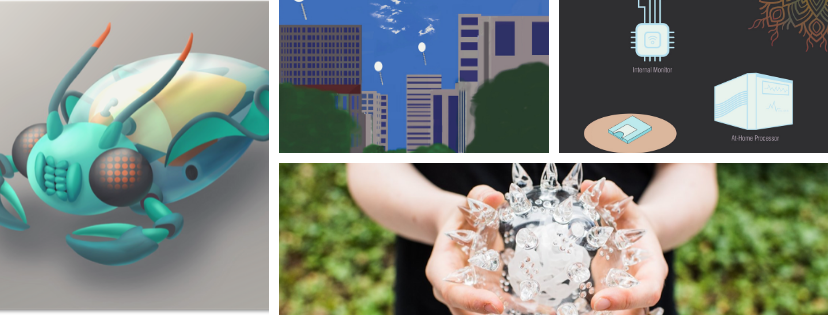JSU Students Competing in International Biodesign Challenge
05/20/2020

Finding solutions to issues such as reversing the damage mankind has done to the planet is going to take creativity and collaboration. That’s why JSU art students have joined hands with their peers in applied engineering and biology to participate in the 2020 Biodesign Challenge.
Sponsored by the National Endowment for the Arts, JSU is one of only 46 high schools and universities from across the globe and the only university in the Southeastern US chosen to participate in the prestigious competition.
“It’s putting our name out there internationally,” said Allison McElroy, professor of painting and drawing. “This is the future, and by giving our students this opportunity, JSU is leading the way.”
McElroy has teamed up with Dr. Jimmy Triplett, assistant professor of biology, and Teje Sult, instructor of applied engineering, to teach the undergraduate course “Biodesign-Challenge” in the spring and summer semesters this year. Students from all three departments enrolled in the class and have been split into teams and tasked with identifying a societal problem and designing its creative solution.
“We have artists creating, scientists editing genes, and engineers making it all come together,” McElroy said.
The student-led teams have created three concepts for the competition:
- The Atlas Project: Aimed at clearing the skies of smog and pollution, this project uses balloons to filter the air and collect space debris. Group members include Matthew Hillgartner and McKenna Mitchell.
- The Ocean’s Plastic Eating Robot (TOPER): This animal-like robot would work to remove the 10 billion pounds of trash from the Earth’s oceans. Group members include Gabrielle Armstrong, Kate Dempsey, Jamal James, Emma Lindsey, Ruby Thamert and Reagan Tidmore.
- Vital Skin: To combat the rising cost of health care, this skin implant would provide at-home diagnostics, diagnoses and treatments to patients with limited access to health care providers. Team members include Avery Lowe, Abigail Read, Kyra Watral, Will Milner, Thomas Galbreath and Amanda Pinckard.
After the class projects were completed by the students and edited and packaged by MFA graduate assistant Carol Record, they were sent to expert consultant Will Walker, an interactive designer at Google in San Francisco, for assessment. Walker selected Vital Skin as the winning concept to compete in the global competition on June 15-19.
Originally, the winning team was scheduled to travel to New York City to present their final designs at the Metropolitan Museum of Modern Art (MOMA) but, due to COVID-19, the competition will take place entirely online this year. The JSU team will present on June 16, 10:30-10:45 a.m. central time, online here. Prize winners will be announced on June 19.
“My students have done a remarkable job continuing through the pandemic,” McElroy said. “Working on a team project remotely has its adversities and the students handled it gracefully and very professionally.”
Several prizes will be awarded during the competition, with the top team taking home the coveted Glass Microbe, a unique art piece that symbolizes the intersection of art, design and biology. But McElroy thinks the true reward lies in the process.
“This gives the artist a new voice,” McElroy said. “We’re not just making pretty pictures, but discussing how we can help make things better in the future.”
Traditionally trained as an oil painter, McElroy now incorporates 3D materials into her work – from cobwebs to green bean leaves munched on by bugs. “My work turned from painting to more of an environmental artist, looking at different ecosystems and how they work together,” she said. “I call myself a fake scientist.”
McElroy, who first came to JSU in 2007 before becoming full-time faculty in 2008, just returned from an artist residency in Brazil, where she studied alongside scientists during a 10-day immersion in the Amazon rain forests. Having just returned to campus from this “life changing” experience, she was newly inspired as she turned her attention to the projects of her Biodesign students.
“The class blows my mind,” McElroy said. “It makes me so happy and gives me hope for the future.”
For students interested in biodesign, the course will be offered again in Fall 2020, though not part of the global competition. Look up AE 478, ART 478 or BY 474 in the class schedule.

